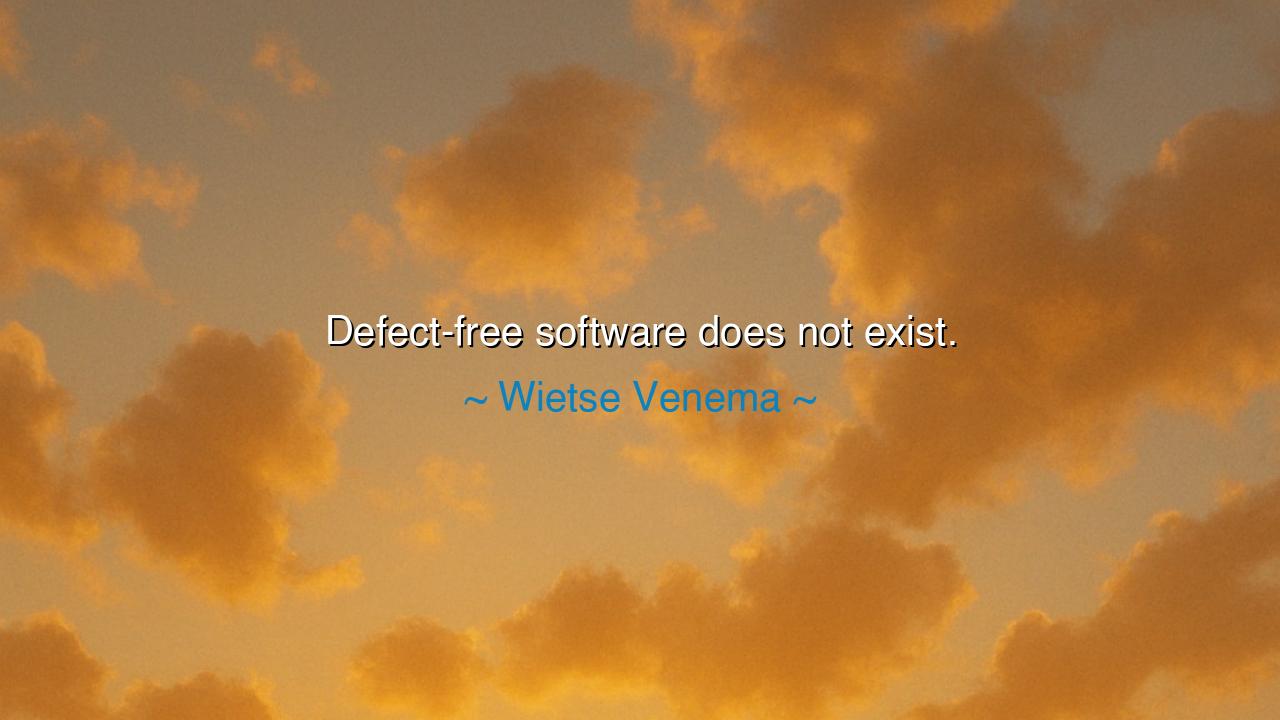
Defect-free software does not exist.






Hear the sharp wisdom of Wietse Venema, master of security and software, who declared: “Defect-free software does not exist.” These words may seem heavy, even discouraging, yet they carry the weight of reality and the light of guidance. For Venema, who forged powerful tools of defense in the digital world, spoke not to despair but to awaken humility—that we may see our limits clearly and act with vigilance.
The phrase defect-free software is itself a paradox. Software is the creation of human minds, crafted line by line, but every mind is finite and every hand imperfect. Within millions of lines of code, even the smallest error can slip by—an overlooked condition, a forgotten edge case, a subtle interaction of systems. Like cracks in marble or flaws in steel, defects are the shadow of creation. To pretend otherwise is folly; to accept it is wisdom.
This truth is written in history. Think of the Ariane 5 rocket, which in 1996 exploded less than a minute after launch because of a small software error—an arithmetic overflow, hidden deep in code. The defect was small, the consequence catastrophic. Or recall the Therac-25 radiation machine, which delivered lethal overdoses to patients due to flawed software logic. Each tragedy reminds us: even the most brilliant code can harbor defects, and the cost of ignoring this truth may be human lives.
Venema’s warning arises from his own field—computer security. He knew that attackers thrive on flaws, that a single overlooked vulnerability can open the gates to exploitation. To believe in defect-free software is to lower your guard, to imagine safety where none exists. But to acknowledge imperfection is to live in readiness, to monitor, to patch, to build defenses that assume the enemy will always search for cracks in the wall.
Yet, O listener, this is not a curse but a call to resilience. If perfection cannot be achieved, then excellence lies in discipline: in testing, in review, in vigilance, in humility. Just as the sailor cannot calm the sea but can prepare his vessel, so too the developer cannot banish defects but can reduce them, guard against them, and respond swiftly when they arise. The wisdom is not in promising perfection, but in preparing for imperfection.
The lesson is clear: never trust blindly in your own creations. Whether in code, in plans, or in life itself, know that flaws are woven into every human work. Instead of despair, let this knowledge give you caution, patience, and readiness. Build systems that expect failure and can recover; design processes that anticipate error rather than deny it. In this, you do not conquer imperfection—you master it.
Practical steps follow: test your work thoroughly, seek feedback humbly, update and improve continuously. In software, use peer review, automated testing, and layered defenses. In life, apply the same wisdom—accept imperfection, plan for it, and grow stronger through resilience. For the pursuit of perfection is noble, but the assumption of perfection is dangerous.
Thus remember Venema’s words: “Defect-free software does not exist.” They are not words of defeat, but of truth. Accept them, and you will stand prepared in a world where errors are certain. Ignore them, and you risk being undone by the very tools you trust. The wise do not deny imperfection—they live ready to overcome it.






AAdministratorAdministrator
Welcome, honored guests. Please leave a comment, we will respond soon